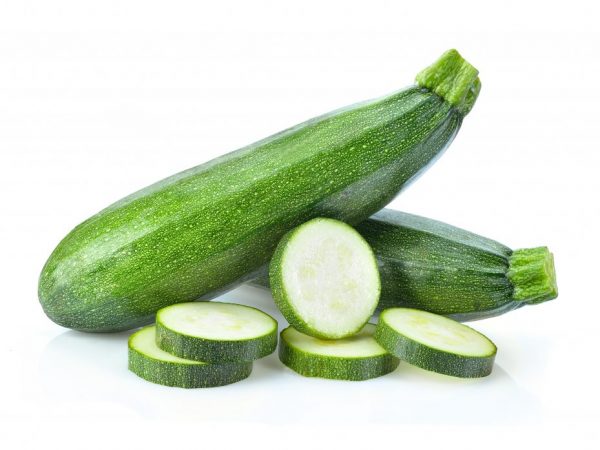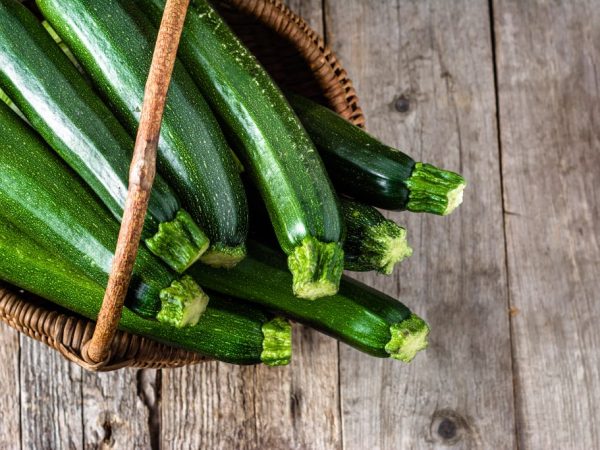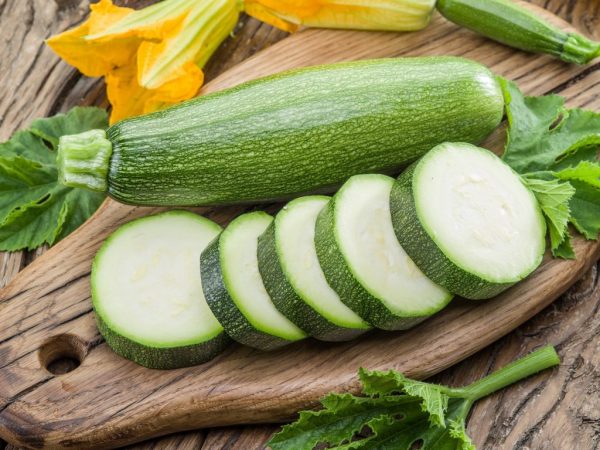Vitamin composition of zucchini
The vitamins in zucchini are a source of health. At the same time, they eat this vegetable in large quantities, without fear of gaining excess weight.

Vitamin composition of zucchini
Vitamin and mineral composition
A dietary vegetable contains only 27 kcal per 100 g. Nutritional value:
- 0.6 g (less than 1%) proteins;
- 0.3 g (less than 1%) fat;
- 4.6 g (3.59%) carbohydrates;
- 1 g (5%) dietary fiber;
- 93.5 g (3.63%) water.
What vitamins are contained in zucchini (per 100 g):
- PP and niacin - 0.6 mg each;
- pyridoxine - 0.11 mg;
- pantothenic acid and alpha-tocopherol - 0.1 mg each;
- beta-carotene, riboflavin and thiamine - 0.03 mg each;
- ascorbic acid - 15 mg;
- folate - 14 mcg;
- biotin - 0.4 mcg.
Compared to white cabbage, zucchini contains 2 times more potassium.
Macro and microelements (per 100 g):
- potassium - 238 g;
- calcium - 15 mg;
- phosphorus - 12 mg;
- magnesium - 9 mg;
- sodium - 2 mg;
- iron - up to 1 mg.
The chemical composition contains mono- and disaccharides and saturated fatty acids.
In what form is it more useful

Raw Vegetable Lowers Cholesterol
The variety, color, shape and size of zucchini have little effect on the content of vitamins and trace elements in zucchini, but the benefits of this vegetable depend on the form in which it is consumed.
- During heat treatment, vitamins of group B are preserved, with the exception of B1, B9 and B2, which lose about 45% of their benefits at high temperatures.
- During the sterilization process, the vegetable retains vitamin A, if the temperature is not increased over 120 ° C.
- Almost no ascorbic acid remains when heated.
- When cooked over a fire, vitamin E is retained.
- The nutritional value of the product is significantly reduced during freezing and long-term storage.
Zucchini dishes should be consumed immediately after cooking, avoiding reheating, which destroys the vitamin and mineral composition of the vegetable.
For the prevention of a number of diseases, zucchini is used in different forms:
- a vegetable, eaten raw or cooked without the use of oil, helps reduce cholesterol;
- increases the process of cell regeneration in stewed or baked form;
- boiled or fried vegetables can regulate digestion processes.
What is the use
Nutritionists consider zucchini to be a natural medicine. They recommend including it in the diet of people with a tendency to gain excess weight, as well as those who adhere to a healthy lifestyle. At the same time, a young vegetable has the greatest benefit.
For cooking, it is recommended to make a choice in favor of dense zucchini, the age of which is no more than 10 days. They contain the largest amount of health-promoting substances. Overgrown vegetables are tough in structure, and their flesh is less juicy.
The vegetable should be consumed as a preventive measure for diseases.
For the circulatory system and heart
Vitamins and minerals are indispensable for normalizing heart function and maintaining a healthy circulatory system:
- vitamins A and C contained in zucchini cleanse the vascular system, lowering the level of cholesterol in the blood, as a result of which it is possible to prevent the appearance of problems with the cardiovascular system, while lowering the level of cholesterol is ensured by the activation of the liver and the rapid processing of fats under the action of bile acids that the liver produces in the process of digesting zucchini fibers;
- a prophylactic agent against atherosclerosis, heart attacks and strokes is the magnesium available in the zucchini;
- strengthens blood vessels and regulates the level of potassium pressure, in combination with magnesium, it is an effective antidepressant agent.
In the fight against oncology

Zucchini normalizes digestion
In the fight against intestinal cancer, the fiber contained in zucchini is effective, which maintains digestion at a normal level, normalizes the content of sugar in the blood and removes harmful carcinogens.
For cell regeneration
Folic acid, which is part of the vegetable, inhibits the growth of free radicals, which acts together with A and C antioxidants with a high effect. These elements prevent aging processes, positively affecting cell regeneration.
The rapid healing of wounds and the maintenance of the skin in good condition depends on the manganese and amino acids that are present in zucchini. Manganese helps to assimilate proteins and carbohydrates, producing sex hormones and participating in the process of synthesizing acids.
Against inflammatory processes
The ascorbic acid present in the composition suppresses the activity of most pathogenic bacteria that are causative agents of inflammatory processes in the body.
Copper helps prevent joint inflammation and prevent the development of arthritis.
To cleanse the body
Liquid and pectins have a strong diuretic effect, they remove unnecessary salts and cleanse the body of toxins.
Against diabetes mellitus
Zucchini seeds contain E and vegetable fats. Eating them in dried form can help in the treatment of diabetes mellitus and cope with depressive conditions.
Who shouldn't use
The dietary product has practically no contraindications, one has only to adhere to the recommendations for its preparation, avoiding, in some cases (for example, with high cholesterol), the use of oils.
Rarely there are bouts of flatulence and allergic reactions, which is a consequence of the individual intolerance of the vegetable.
Conclusion
Zucchini is a dietary product containing a rich vitamin and mineral set that maintains the human body in a healthy state.
To preserve the useful properties of the vegetable, it is recommended to eat it fresh or cook it without increasing the temperature regime more than 100 ° C.

